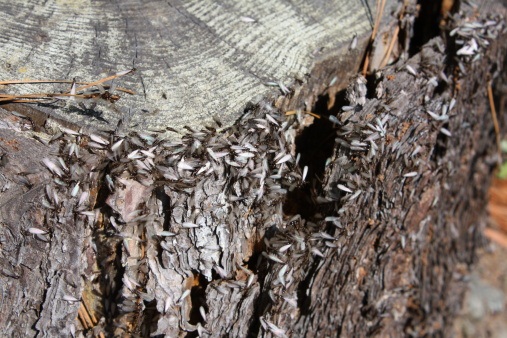TERMITES!!!!!

Such a sight near your home is enough to strike fear into the heart of any homeowner. These are none other than termites, everyone’s favorite secret house guest. While they may not be running through your house and bothering you like roaches or spiders may be, these little guys are known to cause a number of problems in a household including damage to piping, foundation, support columns, and walls (what they eat/live in depends on the kind of termite).
Not too long ago I saw a sight that no homeowner or avid insect avoider would ever want to see—a termite swarm. When you have a large, mature colony of termites, the termites will begin to produce winged offspring that will fly out from the colony to find new places to nest. All of the winged members will fly out at once, making a large swarm of termites flying out from one location.
When we moved into our house there was an old, broken down shed in the backyard that we’d been meaning to knock down. We’d finally decided to get it done and it was a day or two before it was scheduled to be removed when we look out the window and just clouds and clouds of termites began to pour out.
My mom, being hopeful, brought forward that they may have just been flying ants. So we looked into just how you can tell these little guys apart.

While there are a number of notable differences, the easiest one I found defines them is the difference in wings. If you see long, equal sized wings, you’re probably dealing with a termite.
If you see these guys, make sure you get rid of any excess wood your type of termite might like (some like wet, some like dry) and get rid of standing water. If you suspect your house/shed to have termites, it might also be a good idea to get it checked. You don’t want to find out when one of these swarms fly out!
swarm picture–debugged pest control blog, acc. September 6 2016
ant/termite comparison–“Explore Swarming Insects, Swarming Termites, and more”. Pinterest. acc. Septermber 6 2016



Enjoyed reading the article above, really explains everything in detail, and the article is very interesting and effective. Thank you, and good luck with the upcoming articles.
https://betermites.com